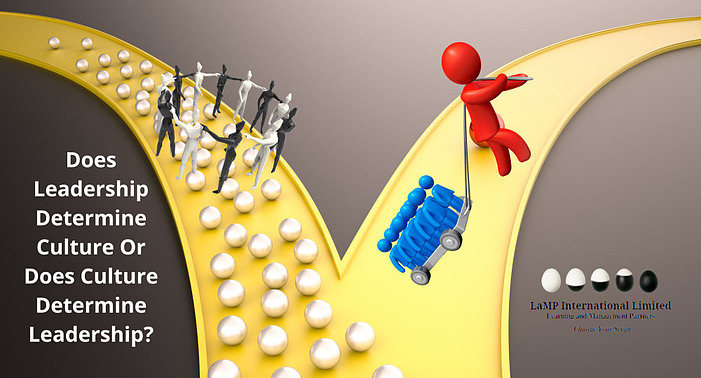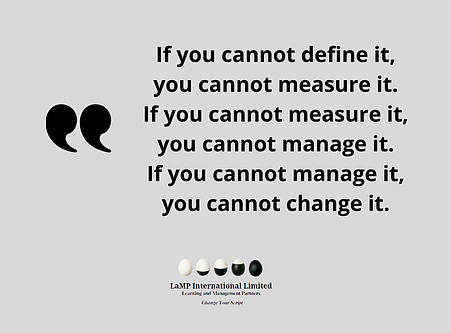
Have you ever pondered on if leadership determines culture or does culture determine leadership? It is a question that I have considered often in my Organisation Development interventions.
It is a chicken and egg kind of question and I am concluding that there may be no “right” answer. Perhaps the answer is “both“.
Finding answers to consider will lead us into the discipline of Organisational Behaviour.
And that is what this article will do. I will share some perspectives on how leadership may influence culture. Then, we will examine the impact culture may have on leadership selection.
Let’s begin!
Leadership Determines Culture Or Culture Determines Leadership?
Both. Leadership sometimes determines culture and culture sometimes determines leadership. Actually, they reinforce and build each other. The longer this cycle goes on, the stronger these organisational muscles become. With stronger muscles comes greater insight, more experience and greater capability. This leads to more effective mastery of both leadership and culture. Eventually, they become cushions for each other.
Effective leaders can and do influence culture. Great leaders tap into this to create a culture that will ultimately deliver the goals and objectives of the organisation. They lead strategy implementation and harness the strength of the culture to grow and develop.
Similarly, culture – the collective human force of the organisation – may covertly and overtly determine the leadership selection and direction.
It may come down to being open and pliable enough to adapt to what the greater need is at any point in time.
We begin by understanding the situation at hand.
It Depends On The Situation
Which one takes precedence really does depend on the situation.
When a new leader joins an organisation, a culture already exists. it is up to the leader to determine if the existing culture is worth retaining as is or if changes are required.
To make this determination, the new leader will have to use data to measure the organisation’s achievements.
- Are goals being met?
- Are goals being met on time and within budget?
- Are Shareholders’ expectations being satisfied?
- Does the organisation have the right talent to produce profitably?
- Are tools and resources being maximised?
- Is the current strategy able to drive future objectives?
- Are our clients, customers and providers engaged and supportive?
It is essential for leaders to understand that they have the power to adapt, recreate, influence or allow the culture to stay as is.
Leadership sets the tone. Followers adopt.
How Is Culture Related To Leadership?
Leadership is important to building organizational culture. Through leadership, leaders communicate and work with each other, their management and their staff. This interaction is how decisions are made and expectations are shared.
A leader’s behaviour – congruent or not – directly impacts the organisation’s beliefs, values, communication style and decision-making. All of these intangibles eventually become norms and the norms form the culture.
John P. Kotter is regarded by many as the authority on organizational culture, change and leadership.
According to Kotter, a leader has soul and passion and uses these to positively align the organisation’s culture by clearly defining and articulating the vision. This vision becomes the beacon to shape (or reshape) the culture that is needed to achieve.
This is especially important when leadership is driving change. To quote Kotter:
“In a change effort, culture comes last not first.”
Do Leaders Need To Learn About Culture?
Yes, they do.
When building or attempting to change a culture, leaders need to understand what currently exists.
Once this is understood, they can choose the strengths to be reinforced. Any weaknesses and inconsistencies identified can be further analysed.
This simple exercise will help to define and manage the change that may be required.
When an organisation’s culture is strong, there is greater trust and cooperation, fewer disagreements and more effective and efficient decision-making. The leadership can also use the culture to provide an informal control mechanism that acts as a gatekeeper. This allows what is needed or wanted in and keeps everything else out.
RELATED READING >>>> What Is The Fastest Emerging Trend In Organization Development?
Each Can Teach One And Change The Other
Once leadership is effective, you soon realise that employees literally talk the language of leaders.
When leaders are respectful to their staff, appreciate people for their work, communicate well, treat all the employees and clients well, have a strong core set of values, are honest and transparent in their approach, are approachable to people in general, you will see employees mirroring the same and vice-versa.
Does this sound familiar?
Remember our cycle of influence and impact?
Congruence helps to cement this and make it more evident in an organisation. This is a way of forming a protective guard around the leadership or culture that you want to preserve.
I have often observed that when new employees join an organisation, they start to align themselves with whichever is stronger – the culture or the leadership.
If the two are not aligned, eventually one dominates. Soon, most employees become reflections of whichever occupies the greater mass.
This could hurt or help both the leadership and/or the organisation.
Closing Thoughts . . .
“Actions speak louder than words.”
Leadership is about building influence. People tend to become influenced or motivated when their leaders are seen as credible, trustworthy, and authentic. In other words, when leadership is congruent.
Most of this is based upon the commitment and consistency of the leadership. People observe and learn from all of these things.
What they observe and hear, they do. Behaviour breeds behaviour. This creates norms and norms shape culture.
Culture, the set of norms that evolve more from unstated behaviour and actions represents the actual beliefs and values of the leaders. They are scrutinized and followed based on the conviction of the leadership or the lack of it.
As we have explored, leadership determines culture and culture determines leadership. It depends on what action is taken – or not.
Some of the most difficult decisions and actions I had to lead in organisations was the separation of formal leadership. In all instances, while the Shareholders were benefitting from high returns on their investments, the culture of the organisations was taking a beating – internally and externally.
Sometimes, courage is needed to break the cycle of influence between leadership and culture and begin a new journey.
Such is the role of the gatekeeper of the organisation’s most important resource, its human resource.
READ THIS NEXT >>>> Why Is The Human Resource The Most Important Of All Resources?
Call To Action
Thank you for reading this blog post.
We would enjoy hearing from you. Share your feedback on this article or our experience with leadership and culture.
Leave a comment below and we will respond.
Perhaps there is a topic you would like us to write about. Give us an idea and we will happily research it and share our perspectives.
About The Author
Cassandra is a Management Consultant, Internationally qualified Facilitator, Coach, Strategist and Behaviour Change Agent. She enjoys travelling, exploring cultures and learning about historical and social networks and dynamics.
Her driving force is the education and development of her tween daughter. The roots of her inspiration to diversify her niche markets and the motivation to expand and scale her business investments rest firmly in this relationship.
This is the reason for creating her legacy.

